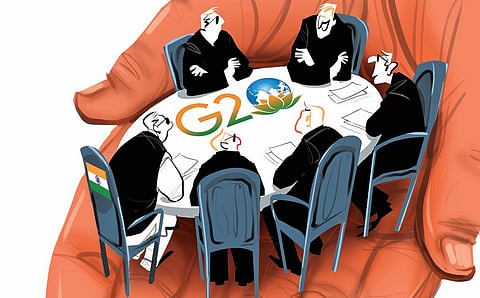

As US President Joe Biden departed from New Delhi after the conclusion of the G20 summit—widely acclaimed as host India’s indisputable moment in the sun—the fact that he headed for Vietnam, the only country that had given China a bloody nose, was a message to Beijing that the world would no longer dance to ‘Emperor’ Xi Jinping’s tune.
Reinforcing the anti-China slant to the conclave was the announcement of the inclusion of the 55-nation African Union in the powerful G20, the urgent need for multilateral development banks to shore up emerging economies, and the proposal to build the India-Middle East-Europe Economic Corridor (IMEE-EC).
It was an unmistakable message to China that its brute aggression exemplified by its duplicitous debt diplomacy, its grey zone militarisation in the creation of a string of artificial islands in the South China Sea, and its steady militarisation on India’s land borders would no longer go unchallenged. Nor would its attempt to replace the United States in its old stomping ground, the Middle East, where Washington had been impolitic in ceding ground to Beijing.
Russian Foreign Minister Sergei Lavrov, who represented his country in the absence of Russian President Vladimir Putin, may have been shunned by most leaders, barring the UN Secretary-General Antonio Guterres, over Russia’s continued attacks on Ukraine, but it was the signal to Beijing which stood out at this G20.
Indeed, the corridor may have been only one among many deals that India pulled off with great aplomb, but this, like much else about the G20 presidency, underscores India’s transformation from a passive observer to an active driver of the arc of anti-Chinese nations that can no longer sit on the fence.
Prime Minister Narendra Modi, with his outreach to Vietnam, Indonesia and the Philippines—all deeply upset with China’s new map and with whom he has shored up strategic and quasi-military ties—has shifted India from the sidelines to the centre stage of the geopolitical churn against China.
Largely provoked by Beijing’s militarisation across the contested Line of Actual Control (LAC) despite repeated attempts to arrive at a consensus on disengagement, the move to look beyond allies Japan and Australia and instead give teeth to its Act East policy through alliances with smaller Asian nations is a definite break from the past. Much to the absent Chinese President Xi Jinping’s discomfort, India, clearly, at the prodding of Washington, is today the emerging challenger to China’s writ.
The unexpected signing off on a Delhi Declaration on the first day of the G20 summit in Delhi by all members, including China and Russia, as the communique cleverly skirted the prickly issue of Russian ingress into Ukraine, was the first signal that India had grown into the role of trusted facilitator, acceptable to leaders of the developed and the developing nations. And with the induction of the African Union, India has been accepted as the new voice of the Global South.
The leeway given to India over not alienating its long-time legacy partner Russia was an interesting insight into how Delhi is viewed within the group. More so, as insiders indicate, the Russian delegation was open to a UN-backed Black Sea Grain initiative, allowing Ukraine to move grain to Turkiye and countries in need.
But the corridor, designed to run circles around China’s hugely unpopular Belt and Road Initiative (BRI) which pushed debt-ridden countries in South Asia like Sri Lanka, Nepal, Pakistan, and several African nations to the brink of economic collapse, was the far bigger signal of China’s misreading of the global mood.
Two years in the making, the recreation of the centuries-old trade route on the ‘Spice Route’—adding spice to India’s ballast as it emerges as a counterbalance to China—points to growing alarm in the West and the Middle East over China’s move to co-opt nuclear Iran, an Afghanistan run by a rogue militia, and Saudi Arabia into an Arab-Central Asian extension of the Belt and Road Initiative.
Pakistan, propped up financially by China, is in economic distress, unable to fund and arm terror groups which were once used to keep India off-balance. Pakistan will fret as key backers Saudi Arabia and the Emirates build stronger economic, trade and tech ties with India, and as Islamabad readies to hand over Karachi port to the UAE. More so as China’s proposed development of the strategic Balochistan port of Gwadar at the mouth of the Strait of Hormuz in the Arabian Gulf is at a standstill, as is the China-Pakistan Economic corridor (CPEC) project after repeated attacks on Chinese workers.
The ‘corridor’, once up and running, will run circles around China’s own corridor. The IMEE-EC was crafted last year by the President of the United Arab Emirates, Sheikh Mohammed bin Zayed Al Nahyan, alongside his National Security Advisor Sheikh Tahnoon Bin Zayed, and the Indian and US NSAs, Ajit Doval and Jake Sullivan, at multiple meetings in Dubai, and in May this year in the Saudi city of Jeddah under the benign eye of the Saudi Crown Prince Sheikh Mohammed bin Salman bin Abdulaziz Al Saud.
The corridor will see a rail bridge connecting Vietnam to Myanmar, Bangladesh and India as the first leg.
Mumbai and the UAE’s critically positioned port of Fujairah, which hosted US frigates during the first Gulf War, will form the next leg, a critical sea link. At the same time, the overland linkage across the Saudi desert—where the legendary Lawrence of Arabia attacked the first rail line built by the Ottomans—will connect to the Israeli port of Haifa, in lands once traversed by spice merchants to destinations in Italy, Germany and France.
Clearly, while speculation about Xi’s absence from the G20 has been put down to a major purge of the People’s Liberation Army and the Chinese Communist Party, his reluctance to share the stage with Prime Minister Modi at the G20 in Delhi may not have been entirely misplaced after all.
Neena Gopal
Foreign policy analyst and author